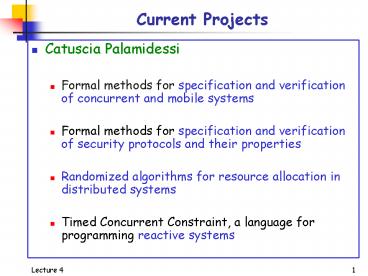Current Projects PowerPoint PPT Presentation
Title: Current Projects
1
Current Projects
- Catuscia Palamidessi
- Formal methods for specification and verification
of concurrent and mobile systems - Formal methods for specification and verification
of security protocols and their properties - Randomized algorithms for resource allocation in
distributed systems - Timed Concurrent Constraint, a language for
programming reactive systems
2
1. Concurrent and mobile systems
- Implementation of (a fragment of) the p-calculus,
a small language for specification and
verification of concurrent process which
communicate via mobile links
3
1. Concurrency and mobile systems
Example of link mobility
U
U
Representation of systems whose Connection
structure changes over time
h
U
U
h
4
2 Security protocols
- Investigation of the spi-calculus, a small
language to express and verify security protocols
and their properties, like - Secrecy
- messages, keys, etc. remain secret
- Authentication
- guarantees about the parties involved in the
protocol - Non-repudiation
- evidence of the involvement of the other party
- Anonymity
- protecting the identity of agents wrt particular
events - Formal tools for automatic verification
5
Example The dining cryptographers
An example of achieving anonymity
Crypt(0)
pays.0
notpays.0
Master
Crypt(1)
Crypt(2)
6
The dining cryptographers
- The Problem
- Three cryptographers share a meal
- The meal is paid either by the organization
(master) or by one of them. The master decides
who pays - Each of the cryptographers is informed by the
master whether or not he is paying - GOAL
- The cryptographers would like to know whether the
meal is being paid by the master or by one of
them, but without knowing who is paying (if it is
one of them).
7
The dining cryptographers Solution
- Solution Each cryptographer tosses a coin. Each
coin is in between two cryptographers. - The result of each coin-tossing is visible to the
adjacent cryptographers, and only to them. - Each cryptographer examines the two adjacent
coins - If he is paying, he announces agree if the
results are the same, and disagree otherwise. - If he is not paying, he says the opposite
- Claim if the number of disagree is even, then
the master is paying. Otherwise, one of them is
paying. In the latter case, the non paying
cryptographers will not be able to deduce whom
exactly is paying
8
The dining cryptographers Solution
Crypt(0)
pays.0
notpays.0
Coin(0)
Coin(1)
look.2.0
Master
out.1
Crypt(1)
Crypt(2)
Coin(2)
9
3 Randomized Resource allocation
- Example The Generalized dining philosophers
- The problem coordinate the activity of several
processes (philosophers), who share common
resources (forks), and need more than one
resource to perform a certain activity (eat). We
want to avoid deadlock and starvation - Generalized means that a philosopher can need
more than two forks and that a fork can be shared
by more than two philosophers
10
Dining Philosophers classic case
- Each fork is shared by exactly two philosophers
11
Dining Philosophers deadlock
Each philosopher is holding one fork
12
Dining Philosophers generalized case
Each fork can be shared by more than two
philosophers

